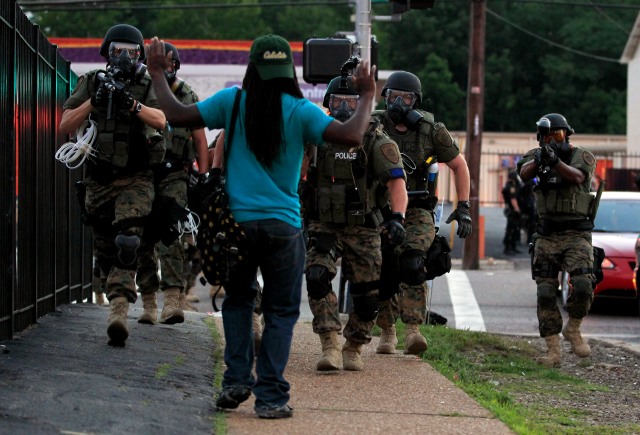
In his poem Dream Deferred, Langston Hughes asked: “What happens to a dream deferred ?” Sixty three years later, we have found an answer in Ferguson, Missouri.
Some people say the anger of the mostly Black population of Ferguson against the police and other authorities in that small city is predictable and long-overdue. It appears that the dream promised to all Americans — the ideals of freedom, equality and opportunity — have bypassed the Black people of Ferguson.
Does it dry up
like a raisin in the sun?
Or fester like a sore—
And then run?
The decades-old phenomenon of “white flight” left Ferguson predominantly Black — more than 60 per cent — but it seems its residents have little, if any, involvement or voice in its institutions.
For example: The police department of 53 has three African-American officers, the mayor and five of its six city councilors are white, the school board is all white, about 12 per cent of residents vote in local elections and the poverty level stands at 22 per cent. It seems that Ferguson is not a good place for Black people.
Does it stink like rotten meat?
Or crust and sugar over—
like a syrupy sweet?
As one resident told the New York Times, the police shooting of 18-year-old Michael Brown was the straw that “broke the camel’s back.”
Details of the shooting continue to emerge but this we do know: Brown, an unarmed young Black man was shot to death by a white police officer in broad daylight after a confrontation.
Negative interaction with police and Blacks in Ferguson isn’t uncommon. According to reports, Blacks are 37 per cent more likely to be stopped by police than other residents. And although Blacks make up 67 per cent of the population, they accounted for 93 per cent of arrests last year.
Blacks in Ferguson have grudgingly tolerated this reality for decades.
Maybe it just sags
like a heavy load.
But it would be a mistake to see the events in Ferguson as an isolated incident in America. The modern and more recent history of the interaction between African-Americans and law enforcement is a checkered one — Rodney King, Amadou Diallo, Jordan Davis and Trayvon Martin.
In an interview, Darnell Hunt a UCLA professor and director of the Ralph J. Bunche Center for African-American Studies, says although police were not involved directly in all of these incidents, ” they represent this whole idea that black male youth constantly represent a threat to police and deadly force can be used to keep them in check, even if they’re unarmed.”
Or does it explode?
In part, what we are seeing in Ferguson is what happens when people have little of no social capital; no connection to the wider community, each other or its institutions. Social capital, according to Robert Putnam, engenders trust, reciprocity, information, and cooperation.
The police department and other important institutions in Ferguson have no connection — no social capital — with the Black community.
After calm has returned to Ferguson, as it must, the establishment of social capital must take place. As a start the police department must better reflect the community it serves.
Of course it will take more than having a few more African American cops on the beat. But reconciliation begins with honest and open dialogue.
It will not be easy. But the consequences of failure are written in history.
Dream Deferred
What happens to a dream deferred?
Does it dry up
like a raisin in the sun?
Or fester like a sore—
And then run?
Does it stink like rotten meat?
Or crust and sugar over—
like a syrupy sweet?
Maybe it just sags
like a heavy load.
Or does it explode?
—Langston Hughes (1902-1967)

A very thoughtful piece.
LikeLike
Thanks for your comment. The situation in Ferguson has had me thinking about many things lately. It is a perfect opportunity to consider workable solutions to a historic problem.
LikeLike
Nice post. The Ferguson situation certainly smells. If it is true that he was stealing from that convenience store, it looks like Brown was pushing the limits of social capital a little himself. However, that is no excuse whatsoever for a policeman to kill an unarmed man who apparently had his hands up already! A tragedy for Brown’s family, for Ferguson, and for the USA as a whole. As for the missing social capital? In my view, this is at the lowest it has been in a century, within the white community, within the black community, and between them (as well as between these and many other ethnically isolationist communities). It’s time Western “civilization” as a whole to take stock of what it means to be civilized.
LikeLike
Thanks for this Bill. Yes, I too am concerned about the diminishing levels of social capital. Low voter turnout and involvement in community-based activities that benefit everyone, are just two examples that come to mind. It shows up as a lack of empathy for others and gives people ‘permission’ to be uncivil towards each other. I wonder if we are prepared to have that discussion about what it means to be “civilized.”
LikeLike
Great insight into a terrible situation. Even after most of the initial fallout has subsided, I’ve come away from the situation with a sense of disappointment, but it’s reassuring to hear sane voices responding to the tragedy with profound reason.
LikeLike
Thanks for your comment Brian. I agree that “sane voices” have helped to calm the waters. But there is so much to be done. In many ways Ferguson is a microcosm of what is happening in major urban centres; not only in the United States but in Canada and the United Kingdom.
LikeLike